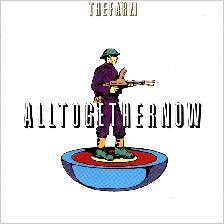All Together Now: True meaning of The Farm's anthem
- Published
All Together Now, by The Farm, was a number four hit in December 1990
When Peter Hooton, lead singer of Liverpool band, The Farm, wrote his anti-war song, All Together Now, he probably wasn't expecting it to be used as a World Cup song for Germany 2006.
All Together Now, probably The Farm's best known song, was released 20 years ago this month.
And the band, who are still together, are celebrating with a gig in Liverpool followed by a rave at a secret venue.
But whilst the song has been used in numerous ways over the last two decades, many people don't know what it's actually about.
Hooton says he wrote the lyrics after watching the late Labour politician Michael Foot being criticised for wearing a "donkey jacket" at the cenotaph in London on Remembrance Sunday.
"It got me so angry. I thought, here's someone representing the soldiers in the trenches who were full of lice, surrounded by vermin.
"They would have been proud that someone like Michael Foot was there to remember them, whatever he was wearing."

All Together Now has been re-released in aid of a charity helping soldiers in Afghanistan
He says even though the song is better associated with football than war nowadays, there's no ambiguity about the meaning.
One of the lyrics states: "A spirit stronger than war was at work that night, December 1914, cold, clear and bright."
"It's about the working classes being sent to war. People across a divide who probably had more in common with each other than the people who had sent them to war in the first place," says Hooton.
The song reached number four in the charts in December 1990. But since its release 20 years ago it's been used in numerous ways - losing that all important meaning in the process.
It's been used in adverts, for countless football team songs, including Everton FC, Euro 2004 and most recently Barrow AFC for their FA Trophy campaign. It was used too by Atomic Kitten and Goleo VI, as a World Cup song in Germany 2006.
"They took away the words 'no man's land' because I don't think they wanted a reference to the war," Hooton says.
Corporal Jay Wheeler calls himself The Farm's number one fan. And he's been spreading the word at work, as a serving soldier in the Queen's Royal Hussars and now the Reservists.
He says at the end of every tour his squadron would have a party and he would insist the song was played. It became a squadron and then regiment custom to play it at the end of every tour.
"When I was in Iraq in 2008 I was part of the transition, teaching Iraqi soldiers British military skills. I thought I'd inject a bit of fun into it, so I got this squadron of Iraqi soldiers to sing the chorus. And it worked - because it brought barriers down.
"I know it's an anti-war song. I've got no gripes with that and I'm not about to argue with Peter Hooton's philosophy on All Together Now - but the sentiment, 'let's go home', it just works for us."
Hooton says the song's meaning has been diluted through its various uses. He finds it difficult to listen to the football and techno versions, but he'll always be moved by the original.
He went to a school in Bootle, Merseyside recently where the children sang his song and read out World War I poetry.
"That was very moving for me, very poignant."
This week, All Together Now has been re-released, this time for the charity Operation Shoebox, which sends gifts in shoeboxes to soldiers serving in Afghanistan.
Hooton says the idea of a spirit stronger than war is as important today as it ever was.
Corporal Wheeler says: "Life throws so much crap at us from time to time. That song, in whatever form, will kind of put the world to rights in its own little way."
Perhaps in the end that's all the protest song writer can ever really expect: simply to help people to put their own individual worlds to rights.